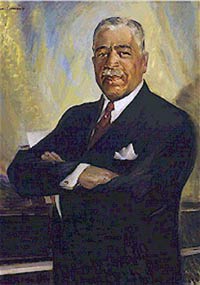Readings:
Psalm 103:1-5, 20-22
Isaiah 42:10-12
Romans 15:5-11
Luke 1:39-45Preface of the Epiphany
[Common of an Arist, Writer, or Composer]
[For Artists and Writers]
PRAYER (traditional language)
God, our strong deliverer: We bless thy Name for the grace given to Harry Thacker Burleigh, who didst lift up in song the struggles of thy people. Let that Spirit of love which spurred him draw us and thy whole Church to raise our distinct voices into one great harmony of praise; through the same Jesus Christ, who with thee and the Holy Spirit liveth and reigneth, one God, now and for ever. Amen.
PRAYER (contemporary language)
God, our strong deliverer: We bless your Name for the grace given to Harry Thacker Burleigh, who lifted up in song the struggles of your people. Let that Spirit of love which spurred him draw us and your whole Church to raise our distinct voices into one great harmony of praise; through the same Jesus Christ, who with you and the Holy Spirit lives and reigns, one God, now and for ever. Amen.
This commemoration appears in A Great Cloud of Witnesses.
Return to Lectionary Home Page
Webmaster: Charles Wohlers
Last updated: 13 July 2019
HARRY THACKER BURLIEGH
COMPOSER, 11 Sept. 1949
 Henry "Harry" Thacker Burleigh (December 2, 1866 – September 12, 1949), a baritone, was an African American classical composer, arranger, and professional singer.
Henry "Harry" Thacker Burleigh (December 2, 1866 – September 12, 1949), a baritone, was an African American classical composer, arranger, and professional singer.
In 1894, he became a soloist for St. George's Episcopal church in New York City. There was opposition to hiring Burleigh at the all-white church from some parishioners, because of his race, at a time when other white New York Episcopal churches were forbidding black people to worship. J. P. Morgan, a member of St. George's at that time, cast the deciding vote to hire Burleigh. In spite of the initial problems obtaining the appointment, Burleigh became close to many of the members during his long tenure as a soloist at the church.
Burleigh also made the first formal orchestral arrangements for more than 100 Negro spirituals, including Nobody Knows (the Trouble I've Seen). Burleigh's best-known compositions are his arrangements of these spirituals, as art songs. They were so popular during the late 1910s and 1920s, that almost no vocal recitalist gave a concert in a major city without occasionally singing them. In many ways, the popularity of Burleigh's settings contributed to an explosion of popularity for the genre during the 1920s. Through the 1920s and 1930s, Burleigh continued to promote the spirituals through publications, lectures, and arrangements. His life-long advocacy for the spiritual eclipsed his singing career, and his arrangements of art songs.
He was the first black composer to be instrumental in the development of a characteristically American music and he helped to make black music available to classically-trained artists both by introducing them to the music and by arranging the music in a more classical form.
(more from Wikipedia)